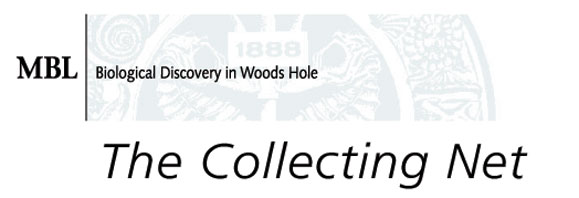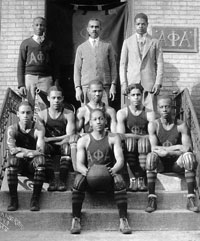| |

Spring 2006, Vol. 2, No. 1 | Index
Woods Hole Black History Month
2006 Events
The Woods Hole Black History Month Committee is pleased to announce 2006 Woods Hole Black History Month events sponsored by the MBL, the National Marine Fisheries Service, the U.S. Geological Survey, the U.S. Coast Guard Group Woods Hole, the Sea Education Association, and the Woods Hole Oceanographic Institution.
 |
|
Celebrating Community: A Tribute to Black Fraternal, Social and Civic Institutions
|
|
February 9
Robert Ward, Dean at Southern New England School of Law, will discuss the relationship between the law and race relations in America since the founding of our nation.
12:00 PM, Redfield Auditorium, Woods Hole Oceanographic Institution
February 13
the Reverend Canon Cecil A. Scantlebury, will give a presentation in celebration of the life of Absalom Jones, the first black priest in the Episcopal Church, whose birthday is observed on February 13.
3:00 PM, St. Barnabas Episcopal Church, Falmouth
February 17
Robert Harris, Professor of African-American History at Cornell University will speak on the foundation of Black fraternal, social, and civic institutions at the beginning of the 21st century.
3:00 PM, Lillie Auditorium, MBL
February 23
Harambee – An ethnic potluck feast welcoming everyone of every race. Samba Cisse, West Africa and Company, and Tara Murphy, will perform African drumming and dancing. Don’t forget to bring your favorite potluck dish and enjoy an evening of multicultural arts, crafts, and music.
4:00 PM, Swope Dining Room, MBL
|
|
|
|
Message from the Equal Employment Opportunity Coordinator
The History of Black History Month
February is Black History Month, which has been celebrated annually since 1926. It was initiated by Carter G. Woodson, the son of former slaves who spent his childhood working in coal mines and quarries until, at the age of twenty, he enrolled in high school. Two years later he graduated and went on to earn a Master’s from the University of Chicago and a Ph.D. from Harvard. During his studies he was disturbed by the way history books ignored African Americans and their accomplishments. He took on the challenge of writing African Americans into the history books, and in 1926, during the second week of February, he launched “Negro History Week” to bring national attention to the contributions African Americans have made throughout American history. He chose this week because it included the birthdays of two famous men, Abraham Lincoln and Frederick Douglass, who greatly influenced the history of African Americans. In 1976 it was expanded to four weeks and its name officially changed to Black History Month to honor the bicentennial.
Woods Hole’s own Black History Month officially began in 1980 after two years of planning by Ambrose Jearld, Fisheries Biologist and now Chief of Research Planning and Coordination at the National Marine Fisheries Service. The first guest speaker was Kenneth R. Manning, a Professor of History of Science at the Massachusetts Institute of Technology. While I was not at that event, I can only image that Dr. Manning focused on the achievements in science African Americans made during the 20th century. His subsequent writings include a biography of Ernest Everett Just, published by Oxford University Press in 1983, and an article on “Science and Opportunity” printed in Science 282 (no 5391), 1037, in 1998. In the Science article, Manning recalls how in a 1913 speech to members of the American Association of Science, the then owner and editor of Science made the egregious comment that “There is not a single mulatto who has done creditable scientific work.” That speech was later published in Science 39 (no. 996), 154, 1914. Manning’s own Science article goes on to say that “this myth was common in the white world of science,” since so many of the contributions of African-American scientists went unacknowledged. He states, “The scientific community has, by and large, moved beyond such crude, unsubstantiated myths. The change of attitude first became evident in the 1920s, when research results of African-American scientists began more often to appear alongside their white counterparts in the various professional journals, as blacks began, in greater numbers, to participate in scientific communities at the Marine Biological Laboratory in Woods Hole, MA, and elsewhere.”
As Black History Month continues to move into its second century of existence, it is my hope that all people of color, in greater numbers, will participate “in scientific communities at the Marine Biological Laboratory and elsewhere.” That is the goal of the 2004 Woods Hole Diversity Initiative as well, and one that can be realized if we will recognize the rich advantages of establishing a diverse scientific community.
— Jane MacNeil |
The New Collecting Net is an employee newsletter published by the Communications Office. Comments and suggestions are welcome. Call (508) 289-7423 or e-mail us at

|